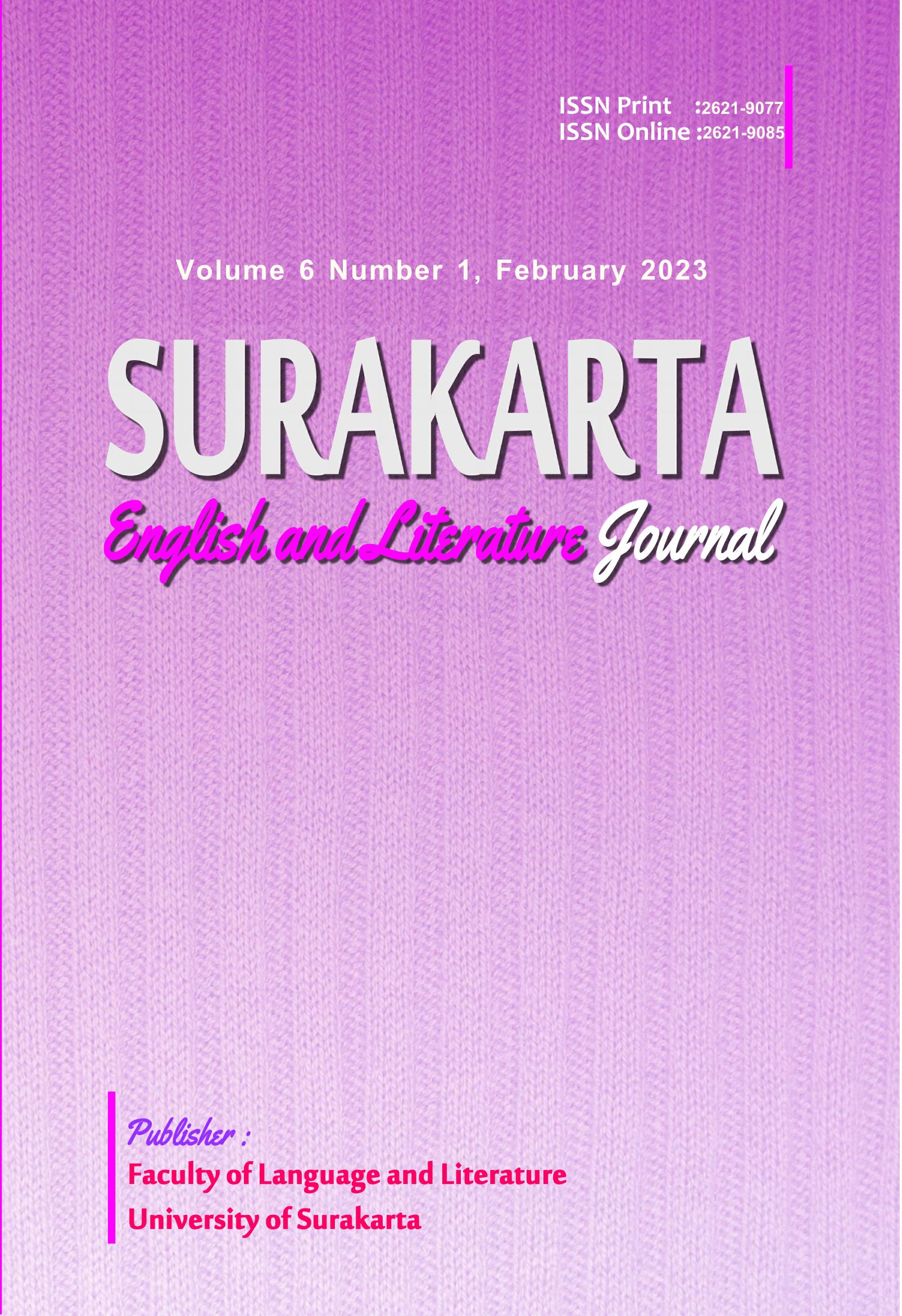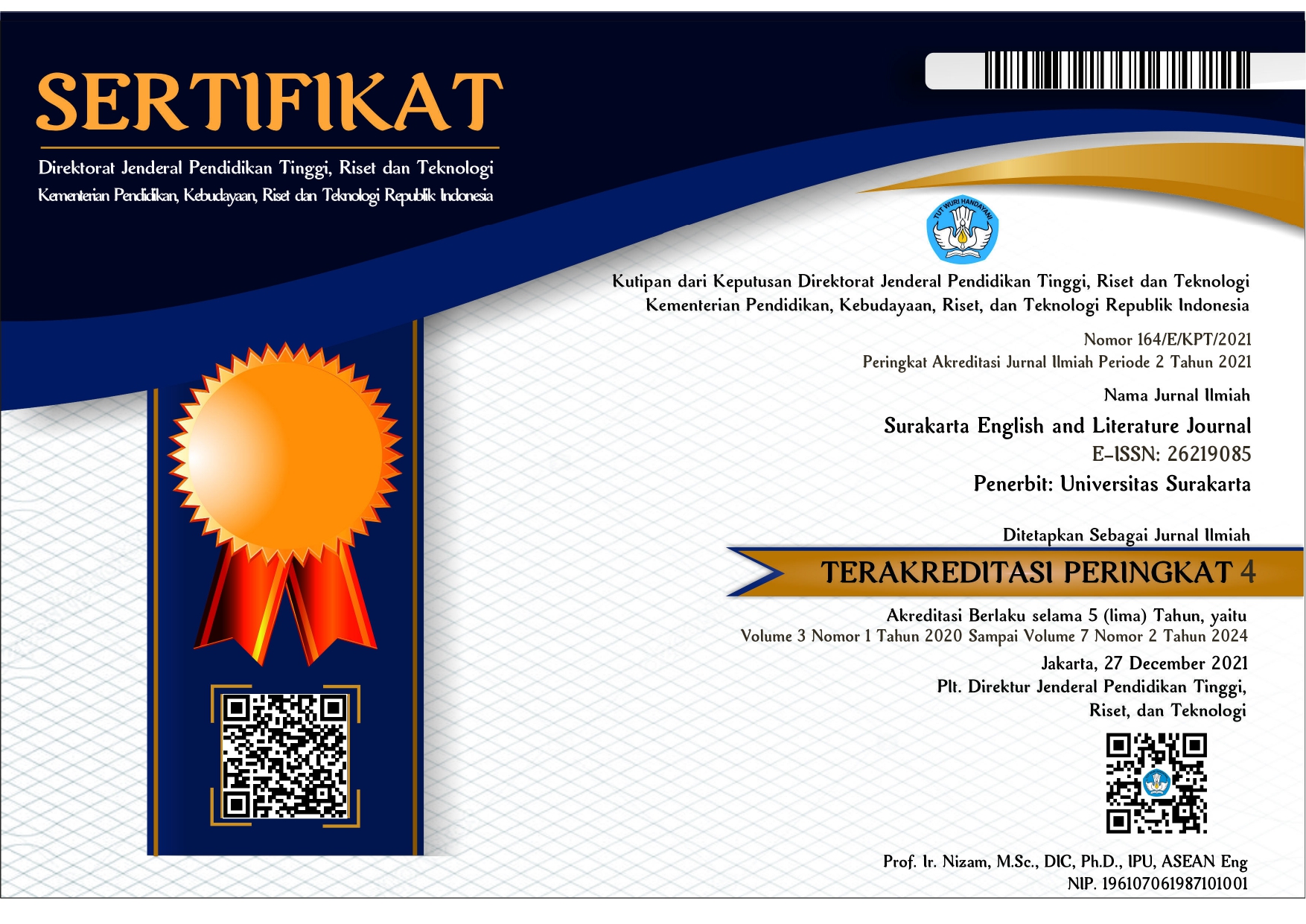An Analysis of Fromm’s Five Basic Needs on Danny Boodman T.D. Lemon 1900 in The Legend of 1900 Movie
DOI:
https://doi.org/10.52429/selju.v6i1.107Keywords:
Erich Fromm, movie, legend of 1900 , literature, psychoanalysisAbstract
How people behave and carry out their will is influenced by psychological factors. Ascertaining the cause of maladaptation, therefore, the psychoanalytic study is necessary. In this research, the writer analyzes the character of Danny Boodman, T.D. Lemon 1900 and his drastic decision in life. The writer used the qualitative method. The writer focuses on the theory of five basic human needs proposed by Erich Fromm. Moreover, according to the findings, people who do not meet Fromm's five essential human needs will struggle to lead everyday lives. According to Fromm, there are two ways to resolve the existential dilemma: to progress or to regress to the mother's love and its evolutionary equivalent, a symbiotic relationship with the mother. The SS Virginian cruise ship is a metaphor for a mother's love of rootedness. Thus, this study concludes that Nineteen Hundred cannot achieve Fromm's five basic needs due to his obsession with the ship.
References
Chorro, E. G., Fernández, M. Á. M., & Corbí, R. G. (2017). Happiness and values in the formation of personal identity in students of the fifth and sixth grade at primary school. Universal Journal of Educational Research, 5(5), 881–890.
Cortina, M. (2015). The greatness and limitations of Erich Fromm’s humanism. Contemporary Psychoanalysis, 51(3), 388–422.
Costantini, M. V., & Golinelli, P. (2007). Aestheticism and creativity in 1900: The Legend of the pianist on the Ocean by Giuseppe Tornatore (Italy, 1998). Aestheticism and Creativity in 1900: The Legend of the Pianist on the Ocean by Giuseppe Tornatore (Italy, 1998), 27(4), 467–473.
Dong, Y. (2021). Character and decision meaning analysis of The Legend of 1900. The 2021 3rd International Conference on Literature, Art and Human Development (ICLAHD 2021), 346–349.
Durkin, K. (2019). Erich Fromm and Theodor W. Adorno reconsidered: A case study in intellectual history. New German Critique, 46(1), 103–126.
Feng, T. (2021). A study on the conflicts between industrial culture and individual value and spiritual freedom in The Legend of 1900. 2021 International Conference on Education, Language and Art (ICELA 2021), 1024–1029.
Fromm, E. (2008). The sane society. Routledge Classics.
Fuchs, C. (2020). Erich Fromm and the critical theory of communication. Humanity & Society, 44(3), 298–325.
Funk, R. (2014). Foreword: Erich Fromm’s social psychological approach and its relevance for today. In S. J. Miri, T. M. Kress, & R. L. Lake (Eds.), Reclaiming the Sane Society (pp. xi–xxiv). Sense Publishers.
Gabriel, N. (2022). Growing up in society - a historical social psychology of childhood. Historical Social Research, 42(4), 207–226.
Given, L. M. (2008). The SAGE Encyclopedia of Qualitative Research Method. SAGE Publications, Inc.
Gruszczyk, A. (2016). Old dilemmas renewed: Fear of freedom vs. freedom from fear. GLOCALISM: JOURNAL OF CULTURE, POLITICS AND INNOVATION, 1–17.
Guo, Y. (2022). Enlightenment values of Erich Fromm’s humanistic psychoanalysis. Acta Psychologica Sinica, 54(2), 205–218.
Holden, S. (1999, October 29). “The Legend of 1900”: How to Lose Your Mooring but Remain Immobile. The New York Times. https://www.nytimes.com/1999/10/29/movies/film-review-how-to-lose-your-mooring-but-remain-immobile.html
Hoskin, R. (2017). Reconsidering ‘The Sane Society.’ Transform, 3, 89–130.
Kallis, G., & March, H. (2014). Imaginaries of hope: The utopianism of degrowth. Annals of the Association of American Geographers, 105(2), 360–368.
Kashani, T. (2016). Movies change lives: Pedagogy of constructive humanistic transformation through cinema. Peter Lang Inc.
Kubrak, T. (2020). Impact of films: Changes in young people’s attitudes after watching a movie. Behavioral Sciences, 10(5), 1–13.
Pacquing, I. R. B. (2020). Problem in identity, postmodernism, and Erich Fromm. Philosophia: International Journal of Philosophy, 21(1), 77–88.
Phares, E. J. (1984). Introductions to Personality. Charles E. Merrill Publishing Company.
Powell, D. H. (1983). Understanding Human Adjustment: Normal Adaptations Through the Life Cycle. Little Brown & Co.
Rajan, S. K. (2017). An approach to psychological literary criticism by means of Frommian humanistic psychoanalysis. In L. Mathew & R. Gayathri (Eds.), Influence of Neo-Freudian theories in 20th century literature (First, pp. 37–42). SFS College Publishers.
Reischer, H. N., Roth, L. J., Villarreal, J. A., & McAdams, D. P. (2020). Self-transcendence and life stories of humanistic growth among late-midlife adults. Journal of Personality, 1–20.
Saumantri, T., & Hafizd, J. Z. (2022). Rekonstruksi psikonalisis humanis dialektik Erich Fromm dalam pendidikan pesantren. RAUSYAN FIKR: Jurnal Ilmu Studi Ushluddin Dan Filsafat, 18(1), 111–133.
Schmitt, B., Brakus, J. J., & Biraglia, A. (2022). Consumption Ideology. Journal of Consumer Research, 49(1), 74–95.
Sherburne, M. (2020, February 12). Love matters: How parents’ love shapes children’s lives. Https://News.Umich.Edu. https://news.umich.edu/love-matters-how-parents-love-shapes-childrens-lives/
Thomas, P. A., Liu, H., & Umberson, D. (2017). Family relationships and well-being. Innovation in Aging, 1(3), 1–11.
Walborn, F. (2014). Religion in personality theory. Elsevier Inc.
Xu, J. (2012). A brief analysis of the hero’s withdrawing from the business of the world in 1900. Journal of Language Teaching and Research, 3(1), 211–214. https://doi.org/10.4304/jltr.3.1.211-214

Downloads
Published
How to Cite
Issue
Section
License
Copyright (c) 2023 PUTRI RINDU KINASIH

This work is licensed under a Creative Commons Attribution-ShareAlike 4.0 International License.
Licensing for Data Publication
-
Open Data Commons Attribution License, http://www.opendatacommons.org/licenses/by/1.0/ (default)
-
Creative Commons CC-Zero Waiver, http://creativecommons.org/publicdomain/zero/1.0/
-
Open Data Commons Public Domain Dedication and Licence, http://www.opendatacommons.org/licenses/pddl/1-0/













